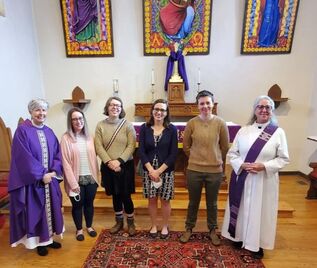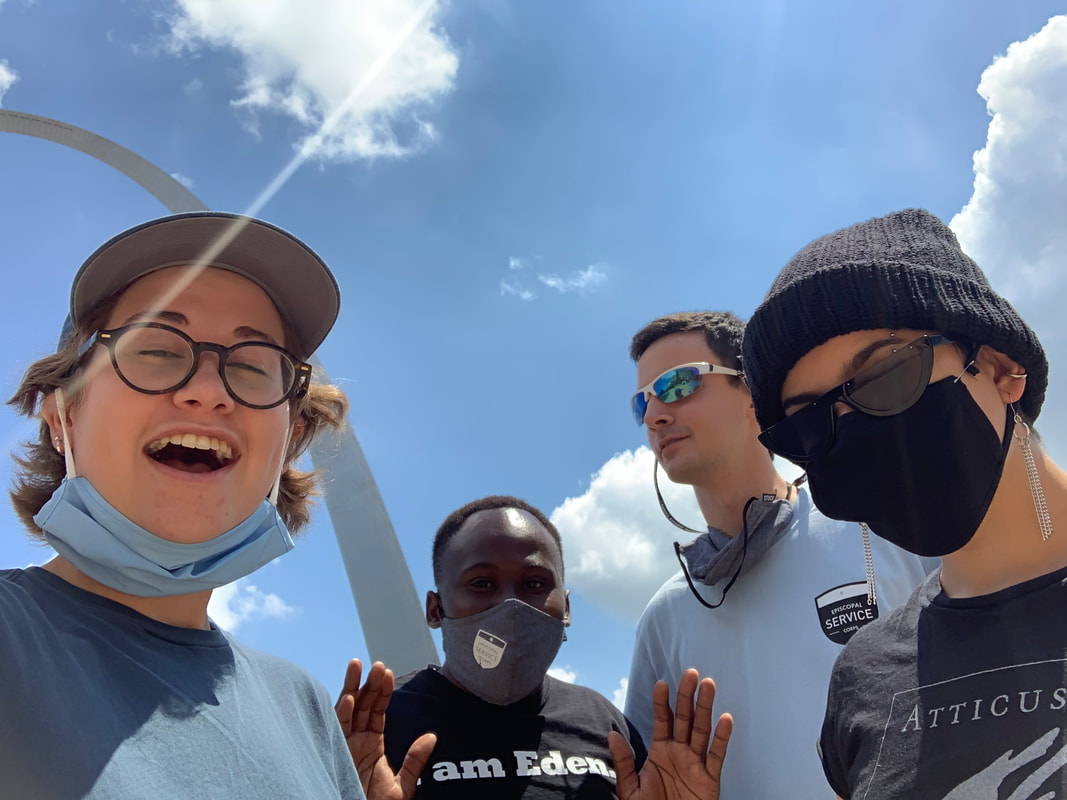 A Sermon by Corps Member Erin O'Rourke for the First Sunday in Lent, March 6th, 2022 based on Luke 4:1-13 at St. Paul's in St. Louis, MO. In today’s passage from the Gospel of Luke, we meet Jesus in the desert– he’s been led here by the Holy Spirit after his baptism. He’s just heard that he is “[God’s] son, [God’s] beloved, with whom [God] is well pleased”. And yet, the spirit has led him to a place of desolation– a place where Jesus is left with his own thoughts, no food, and the Devil– which all sounds like… the exact opposite of what we might think God wants for us.
The more I think about it though, the less surprising Jesus’s situation is. We too, have been told time and again that God loves us, and yet we find ourselves in a desolate place– a world where people make war, a country where government officials try to separate trans children from their loving families and call affirming healthcare child abuse, a community approaching a third year of living through a pandemic. It might feel like God has sent us, God’s beloved children, out into the desert with all the forces of evil. Now interestingly, this story of Jesus being tempted in the desert was recorded in the Gospel, but Jesus was not with any of the disciples during this time. That would mean Jesus shared this story with his disciples later– he thought it was important enough for them to know. What makes this story so important that Jesus would bring it to his disciples, and they would think it sufficiently important to record? What does this story tell us about who God is, and what God wants for us in this season of Lent? Those are the questions that I’ll try to consider this morning. So, going back to the desert– Why would the Spirit lead Jesus there? What if this time of temptation was really a time of discernment– a time for Jesus to make clear what he would and would not do in his earthly ministry. As young people, many of us may also be in times of discernment– about what to study, what to do after graduation, or how we want to spend the rest of our lives. We may also be considering how our faith as Christians factor into that. At this time, take a moment to consider something you might be discerning about, and if you like, share that with the group. … As we return to the Gospel, we see in Jesus some ways he aligns his life and ministry to God’s will, some of which may be helpful in our own discernment Even in his weakened state after fasting for forty days, Jesus is able to confidently assert that he will follow God’s ways, even when the devil presents some convincing alternatives. The devil offers Jesus opportunity after opportunity to glorify himself as an individual but not as God. He offers Jesus a chance to turn a rock into food for himself, a chance to seize power by breaking one of God’s clearly stated commandments, and a chance for Jesus to show off his own power over death as the son of God. In the final case, the devil even quotes a Psalm, twisting language that we associate with God to do evil. Now, Jesus *can* do these things that the devil asks him to do– we see each time that Jesus feeds a crowd that he can work miracles with bread. Jesus tells of the coming kingdom of God, where God will usurp all earthly authority. And we see through his own resurrection, that Jesus has power even over death. But each time Jesus is presented with one of these choices, he decides to do otherwise. When Jesus is presented with these so-called temptations, he has clear answers– each time, a no. He tells the devil, “not today, I’m going to follow God’s example instead”. He decides that he won’t do the things the devil offers to glorify himself but instead stays focused on his mission here on earth. If you look at the kinds of miracles that Jesus does go on to perform, they are always to glorify God, but also to help others– he makes food for crowds, he heals people who are hurting, and he dies to destroy the power of death over us all. You won’t catch Jesus doing something miraculous just to show off. Each time Jesus says no to the devil, he also cites scripture. Though Jesus, being God incarnate, surely knows God’s nature better than any of us humans ever can, he cites familiar passages from the Bible to remind us how we can discern God’s will. Here, Jesus shows us how we can look at the stories people tell about God and the ways God has shown up throughout history to help to discern God’s will for our lives today. Familiarity with Scripture is one of the best tools we have as we try to determine what is “of God” and what is not. But of course, just because God’s will is clear to Jesus, does not mean it is for us. Every day, people make choices to do things that bring them further from God– some clearly evil and sometimes simply mistakes. Since we are only human, it’s certainly harder for us than for Jesus to determine God’s will for our time here on earth. This season of Lent that we’re entering into this week offers us opportunities to do that hard work of discernment. To determine what God wants for us– where we should say yes, and where we should follow Jesus’ example and give a resounding no, persevering in resisting evil. We’re invited to give up things that distract us from God’s ways, to simplify our lives, for now, knowing that we’ll have time to rejoice and celebrate later. We’re invited to enter deeper into practices of prayer and devotion and to learn from the times we’ve fallen short of God’s will for our life. And at those times when we fall short, God also gives us grace, and the opportunity to repent and return to the Lord. A chance to return to the good things that God wills for us by acknowledging our wrongdoing and making amends. This is a beautiful opportunity, but it’s also hard work. As some of you may know, I’m spending this year living in an Episcopal Service Corps community of young adults called Deaconess Anne House. Inspired by the Rule of St. Benedict, our community has a document called a rule of life, which lays out our values and the ways we live them out. Three of these values are Stability, Obedience, and Conversion of Life. Together, these values mean we try to listen and be attentive to the way God is working in our lives and be open to transformation. It means turning away from individualistic ways and towards communal or God-oriented ways. To me, conversion of life means considering the ways my own actions affect other people– the ways I treat my housemates, family members, and friends as anything less than beloved children of God. It means noticing the ways I am complicit in doing evil, and to paraphrase Dorothy Day, trying to create a world where it is easier to be good. One way my community works together toward conversion of life is through lots of shared prayer– each morning, my housemates and I gather as a community and pray morning prayer together, often the version from the Book of Common Prayer. Morning prayer involves reading from scripture and confessing our sins to God. While the specifics of confession are almost always silent, kept between me and God, this confession is a daily chance to consider where I know I can do better. Also, each Friday, our house does a form of the Examen, a form of prayer where we identify places where God has shown up in our lives in the past week, as well as regrets and grievances about times when God seemed far away. While thinking about sin and repenting might sound like negative things, for me getting to spend time with these practices has been life-giving, and they have also helped me to see the places where God is working in my life. A lot of us might think of Lent as a difficult season to move through, especially when the past few years have already made us give up so much. I invite you to reframe this season of Lent not merely to be one of joyless penitence, but instead to be a season of prayerful discernment, of where you can more closely align your life to the good things God wants for all of us. For as Jesus shows us in today’s Gospel, God offers us something so much better than the self-glorifying or even self-destructive ways offered by Satan. God offers us a life of love for each other, a life of community, and eventually a way out of the desert, moving towards God’s kingdom on earth.
0 Comments
Leave a Reply. |
Categories |
|
Mailing address:
DAH c/o Diocese of Missouri 1210 Locust St. Louis, MO 63103 |
(c) 2014 - 2020 Episcopal Diocese of Missouri
|


 RSS Feed
RSS Feed